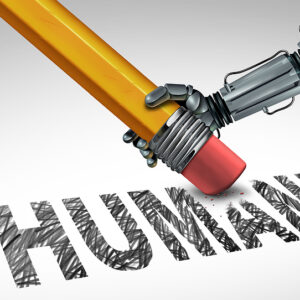The conventional wisdom — don’t you love it? — holds that artificial intelligence won’t cost jobs. But it will. The evidence is mounting.
I say this after doing my best to divine the thinking of the AI community on jobs in my reporting. I have made three television programs on AI and conducted one press briefing, and I have talked to experts at four universities and four AI companies.
All these savants directed me to look at what happened with automation. They pointed out that it was feared that automation — the industrializing of production — would cost jobs, but it had the opposite effect. It created new work since the first steam engine was deployed in England in 1712.
The Luddites, who emerged at the end of the 18th century and who took their name from a legendary figure, Ned Ludd, got it savagely wrong: They thought mechanized weaving, using waterpower and later steam, would endanger the weavers’ livelihood. Of course, it brought about a boom in woven cloth that has lasted to this day.
Similarly, trade unions have fought every advancement in automation in every industrial sector when they have feared jobs would be lost. Jobs have been lost, but new avenues of employment have emerged.
But AI is different and willlikely to subtract jobs without producing new ones.
All the indicators are that jobs will disappear. So much so that in March, Goldman Sachs warned that AI would cost 300 million jobs worldwide, one-fourth of the global workforce.
Challenger, Gray & Christmas, an outplacement services company, reported that India lost 4,000 jobs in May, all directly attributable to AI. My guess is that it is a conservative figure and one that is going up every day.
India has always dealt with the employment problem by overstaffing, and its economy is rife with make-work jobs. AI, especially when India is emerging as a force in the competitive global market, can’t hide jobs. If you remove the infrastructure, there is no place to shelter unproductive people.
What is different about AI, my economist friend Jarrod Hazelton says, is that automation, as we know it, has taken place in an industrial economy, AI has arrived in a service economy, and it is service jobs that AI is poised to eliminate, he says. And it could eliminate them on, yes, an industrial scale.
Connor Leahy is a geek’s geek — AI has been his life since he left a university in Munich. He is CEO of Conjecture Ltd. and a co-founder of the open-source AI research collaborative EleutherAI. With headquarters in London but with worldwide tentacles, Conjecture studies ways in which AI can be controlled. Conjecture takes as its founding template the work of the Wright Brothers before they launched manned flight at Kitty Hawk. The brothers wanted control of their invention and to make it safe for manned flight, and it had to be able to land and fly.
I might add that another aspect of the Wright Brothers’ search for control was the addition of ailerons. They realized leaving the ground would be just the beginning; the aircraft had to be controlled on three axes.
Leahy and his young team believe that much more research and effort needs to be invested in the control of AI to make it safe. He told Christiane Amanpour, on her PBS program, that billions of dollars were being invested in AI as a transformative tool, but only a smidgeon is being spent on making it controllable.
Conjecture seeks to make it safe before it flies any further, to give it ailerons that will control its flight.
Leahy is onto something. Control is needed, but politicians, alarmed over the downside of AI, are calling for regulation.
One may seek control through regulation, but it is premature in something as dynamic, largely mysterious and potentially devastating as AI.
The conventional wisdom on AI is probably wrong about jobs and wrong about regulation. AI needs to be controllable then it can be regulated.


